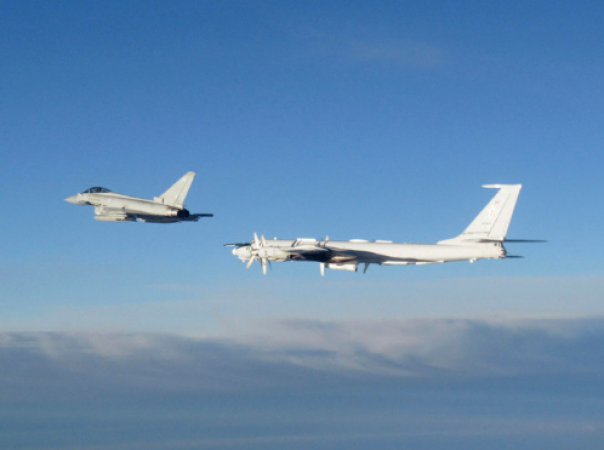
Netherlands: In a tense display of military vigilance, British and Dutch fighter jets jointly intercepted Russian bombers that ventured close to NATO airspace in the North Sea on Tuesday.
The intercepted aircraft, Tu-160 strategic bombers of Russian origin, were escorted away from NATO airspace by Typhoon jets from the Royal Air Force and F-16s from the Royal Netherlands Air Force.
This incident unfolds against the backdrop of escalating Russian military activities near NATO's borders. The timely response underscores NATO's commitment to safeguarding its member nations and thwarting any threats to its security.
The occurrence comes on the heels of NATO's announcement to bolster its presence in Eastern Europe as a direct response to Russia's invasion of Ukraine. The alliance's resolve to defend its members has been unequivocally stated, serving as a countermeasure to Russia's audacious moves.
This interception vividly illustrates that NATO is taking the Russian threat with utmost seriousness. It also serves as a stark reminder of Russia's willingness to test the waters and challenge NATO's resolve.
Expectations of strained relations between Russia and NATO are well-founded. Years of discord over Russia's military activities in Eastern Europe have been exacerbated by the invasion of Ukraine, which has escalated these simmering tensions.
While the long-term repercussions of this incident remain uncertain, one fact is evident: Russia is not averse to taking calculated risks to assert its dominance within the region. NATO must remain poised to respond to any subsequent provocations.
Both the Royal Air Force and the Dutch Ministry of Defence highlighted the routine nature of the interception, asserting that it adhered to NATO's standard operating procedures.
Also Read: Typhoon Lan Strikes Western Japan: Impending Peril as Heavy Rain and Fierce Winds Threaten Region
The RAF underscored that it was a "routine response to Russian aircraft flying in an area of interest to the alliance," while the Dutch Ministry of Defence deemed it a "clear demonstration of the readiness and capability of the Dutch armed forces to protect Dutch and NATO airspace."
This occurrence forms part of a series of close encounters between Russian and NATO aircraft in recent months. The sequence commenced with Russian bombers approaching UK airspace in January, necessitating the scramble of RAF fighter jets. Subsequently, in February, NATO aircraft intercepted Russian jets over the Baltic Sea.
In recent years, the Russian military has significantly escalated its maneuvers near NATO borders, aiming to test the alliance's resolution and deter any intervention in Russia's sphere of influence.
The invasion of Ukraine has heightened already strained relations between Russia and NATO. With sanctions imposed by the alliance and military assistance extended to Ukraine, Russia has issued stern warnings against NATO's interference in Ukraine and hinted at unspecified "military-technical" retaliatory measures.
The interception of Russian bombers is a stark reminder that Russia is prepared to employ military force to further its objectives. It concurrently underscores NATO's acknowledgement of the Russian threat. As the two sides continue on this collision course, the path ahead remains unclear, fraught with intricate diplomatic and strategic considerations.